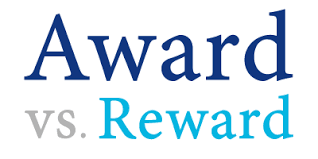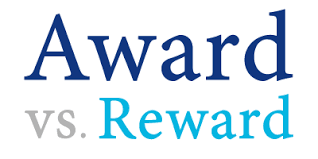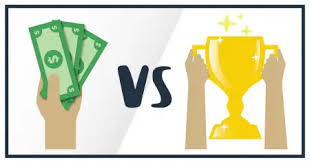Introduction to Reward vs Award
In the realm of recognition and appreciation, two terms often come into play: Reward vs Award. While these words may sound similar, they carry distinct meanings and implications. Understanding the nuances between them is crucial to accurately convey one’s intentions and expectations. In universally accepted terms, a reward is typically bestowed as a result of a particular action or accomplishment, serving as an incentive or recognition of individual efforts.
On the other hand, an award is a formal acknowledgment or honor bestowed upon an individual or group for their exceptional achievements, often accompanied by a public ceremony or presentation. This introduction aims to explore and clarify the fundamental differences between Reward vs Award, shedding light on their significance and impact in various domains of life.
Table of Contents
Meaning of Terms Reward vs Award
- Reward: A reward is a form of recognition or incentive given to an individual or group in response to a specific action, behavior, or accomplishment. It serves as a means to acknowledge and appreciate the efforts, skills, or contributions of the recipient. Rewards can take various forms, such as monetary compensation, bonuses, gifts, privileges, or even simple verbal praise. The purpose of a reward is often to motivate and encourage individuals to continue their positive behaviors or achieve desired outcomes. It is typically given within a specific context, such as in the workplace, educational institutions, or personal relationships, to foster a sense of appreciation and to reinforce desired behaviors.
- Award: An award, on the other hand, is a formal recognition or honor bestowed upon an individual or group for their outstanding achievements, skills, talents, or contributions in a particular field or domain. Awards often involve a comprehensive evaluation process, such as nominations, review committees, and judging panels, to select the most deserving recipients. They are usually presented in the form of a physical object, certificate, or trophy, and may be accompanied by a public ceremony or event. Awards hold a significant level of prestige and are often regarded as symbols of excellence or mastery within a specific industry, profession, or community.

Comparison Table Between Reward vs Award
| Criteria | Reward | Award |
|---|---|---|
| Purpose | Recognize specific actions, behavior, or accomplishments | Honor outstanding achievements, skills, or contributions |
| Nature | Incentive-based, given as a motivation for future performance | Prestige-based, highlighting overall excellence |
| Selection Process | Typically based on individual effort or specific criteria | Involves a rigorous evaluation and selection process |
| Presentation | Immediate or ongoing, often informal or internal | Formal presentation, often accompanied by a ceremony or event |
| Impact | Motivates individuals, reinforces positive behaviors | Enhances reputation, provides long-term recognition |
| Examples | Employee bonuses, verbal praise, privileges | Nobel Prize, Academy Awards, Olympic medals |
Pointwise Differences Reward vs Award
- Purpose: a. Reward: Rewards are given to recognize specific actions, behaviors, or accomplishments. They serve as incentives to motivate individuals to continue their positive behaviors or achieve desired outcomes. Rewards are often used to reinforce and appreciate individual efforts. b. Award: Awards are bestowed to honor outstanding achievements, skills, or contributions in a particular field or domain. They aim to acknowledge and celebrate exceptional accomplishments and recognize individuals or groups for their overall excellence.
- Nature: a. Reward: Rewards are typically incentive-based and are given as a means of motivation. They can be in the form of monetary compensation, bonuses, gifts, privileges, or even simple verbal praise. Rewards are often designed to provide immediate gratification and encourage individuals to maintain their performance levels. b. Award: Awards, on the other hand, are prestige-based. They are given to highlight and celebrate exceptional achievements. Awards hold a significant level of prestige and are seen as symbols of excellence or mastery within a specific industry, profession, or community.
- Selection Process: a. Reward: Rewards are often based on individual effort or specific criteria. For example, in the workplace, rewards may be given based on meeting certain sales targets or achieving predefined goals. The selection process for rewards is usually straightforward and tied to specific metrics or performance indicators. b. Award: Awards involve a more rigorous evaluation and selection process. They often have nomination processes, review committees, and judging panels to ensure that the most deserving individuals or groups are selected. Awards consider a broader range of criteria and assess overall excellence in a particular field or domain.
- Presentation: a. Reward: Rewards are often presented in an immediate or ongoing manner. They can be given informally, such as through verbal praise or recognition in team meetings. In some cases, rewards may be ongoing, such as performance-based bonuses that are provided regularly. b. Award: Awards are presented formally and are often accompanied by a ceremony or event. They are usually given in a public setting, such as award shows, ceremonies, or conferences. Awards are often presented with a physical object, certificate, trophy, or medal to symbolize honor and recognition.
- Impact: a. Reward: Rewards have a direct impact on individuals by motivating and encouraging them to perform at their best. They reinforce positive behaviors and can contribute to a positive and productive environment. Rewards can boost morale, increase engagement, and provide immediate gratification. b. Award: Awards have a broader impact on professional growth, reputation, and recognition. They serve as benchmarks of excellence and can significantly enhance an individual’s or organization’s credibility, visibility, and opportunities for further success. Awards often inspire others and set new standards of achievement within a specific field or community.
- Examples: a. Reward: Examples of rewards include employee bonuses, performance-based incentives, verbal praise and recognition, additional privileges or benefits, and team-based rewards for achieving targets. b. Award: Examples of awards include prestigious honors like the Nobel Prize, Academy Awards (Oscars), Grammy Awards, Pulitzer Prize, Olympic medals, industry-specific awards, or recognition for exceptional contributions in fields such as science, literature, arts, or sports.
It’s important to note that the specific characteristics and criteria of Reward vs Award can vary depending on the context, industry, or cultural practices in different parts of the world.

What is Reward?
A reward is a form of recognition or incentive given to an individual or group in response to a specific action, behavior, or accomplishment. It serves as a means to acknowledge and appreciate the efforts, skills, or contributions of the recipient. Rewards can take various forms, ranging from tangible benefits to intangible expressions of appreciation.
The primary purpose of a reward is to motivate and encourage individuals to continue their positive behaviors or achieve desired outcomes. By providing a reward, whether it is in the form of monetary compensation, bonuses, gifts, privileges, or even simple verbal praise, individuals are more likely to feel valued and recognized for their efforts. This recognition, in turn, can increase their engagement, morale, and overall satisfaction.
Rewards can be employed in various settings, including the workplace, educational institutions, sports teams, and personal relationships. In the workplace, for instance, rewards may be used to incentivize employees to meet certain targets, exceed expectations, or exhibit exceptional performance. By offering rewards, organizations can create a culture of recognition and foster a positive work environment that motivates employees to go above and beyond.
The effectiveness of rewards lies in their ability to provide immediate gratification and reinforcement. When individuals receive a reward, they experience a sense of accomplishment and fulfillment, which can boost their self-esteem and confidence. Furthermore, rewards serve as tangible evidence that their efforts have been noticed and appreciated by others, reinforcing their commitment to maintaining or improving their performance.
It is important to note that rewards should be fair, consistent, and aligned with the desired behaviors or achievements. A well-designed reward system considers factors such as the significance of the accomplishment, the individual’s preferences, and the overall organizational goals. Additionally, rewards should be communicated clearly, ensuring that individuals understand the criteria and expectations associated with receiving them.
In conclusion, rewards play a vital role in recognizing and motivating individuals or groups for their specific actions or accomplishments. They serve as powerful tools for reinforcing positive behaviors, boosting morale, and creating a culture of recognition. When used effectively, rewards can have a profound impact on individual and collective performance, contributing to the overall success and well-being of individuals and organizations alike.
What is Award?
An award is a prestigious form of recognition or honor bestowed upon an individual or group for their exceptional achievements, skills, talents, or contributions in a particular field or domain. It is a symbol of excellence and serves as a testament to the recipient’s outstanding accomplishments. Awards carry significant meaning and impact, not only for the individual or group receiving them but also for the broader community or industry they belong to.
Awards are typically given in various fields, including but not limited to, arts, science, literature, sports, entertainment, business, and humanitarian efforts. They serve as a way to acknowledge and celebrate the highest levels of achievement within these domains. The criteria for receiving an award may vary depending on the specific award and the field it represents. The selection process often involves a comprehensive evaluation, including nominations, review committees, judging panels, or voting systems, to ensure that the most deserving individuals or groups are recognized.
When an award is presented, it is often accompanied by a formal ceremony or event. This ceremony provides a platform to publicly honor and celebrate the achievements of the recipients. Awards are typically presented with a physical object, such as a trophy, medal, plaque, or certificate, which serves as a tangible reminder of the honor bestowed upon the recipient. The ceremony and the physical representation of the award add to its significance and create a memorable experience for the recipient.
Receiving an award has a profound impact on the individual or group being recognized. It validates their hard work, dedication, and talent, and serves as a validation of their contributions. Awards often bring increased visibility, respect, and credibility within their respective fields, opening doors to new opportunities and collaborations. They inspire others by setting new standards of excellence and serve as role models for aspiring individuals or groups.
Furthermore, awards contribute to the advancement and growth of a particular industry or community. They recognize and promote innovation, creativity, and excellence, encouraging others to strive for greatness. Awards foster healthy competition and motivate individuals or groups to continuously push the boundaries of their fields, resulting in overall progress and development.
In conclusion, an award is a prestigious recognition and honor bestowed upon individuals or groups for their exceptional achievements or contributions in a specific field or domain. It represents the pinnacle of excellence and serves as a testament to the recipient’s talent, hard work, and dedication. Awards have a profound impact on the recipients, their industries, and communities at large, inspiring others and fostering continued growth and innovation.

Reward vs Award Which one is more beneficial?
In simple terms, both rewards and awards can be beneficial, but their benefits may differ based on the context and the goals they aim to achieve.
Let’s consider a practical example to understand this better. Suppose you’re a manager in a company and you want to motivate your team to meet a challenging sales target.
Reward: In this case, offering a reward, such as a performance-based bonus or a team outing, can be beneficial. The reward serves as an incentive to encourage your team members to put in extra effort and achieve the sales target. The benefit of rewards is that they provide immediate gratification and can boost morale, increase motivation, and enhance teamwork within the team. The tangible nature of rewards, such as receiving a bonus, can also have a positive impact on individuals’ financial well-being.
Award: On the other hand, if your team surpasses the sales target and achieves exceptional results, giving them an award, such as the “Top Sales Team of the Year” award, can be more beneficial. The award recognizes the team’s outstanding performance and serves as a symbol of their excellence. The benefit of awards is that they provide long-term recognition and prestige. The award can enhance the team’s reputation within the company and the industry, opening doors for career advancements, promotions, and increased visibility. It can also inspire other team members to strive for excellence and set higher goals.
In summary, rewards are beneficial for providing immediate incentives and boosting motivation, while awards are more beneficial for long-term recognition, reputation building, and inspiring others. Both rewards and awards have their place and can be used strategically depending on the specific goals, context, and desired outcomes.

